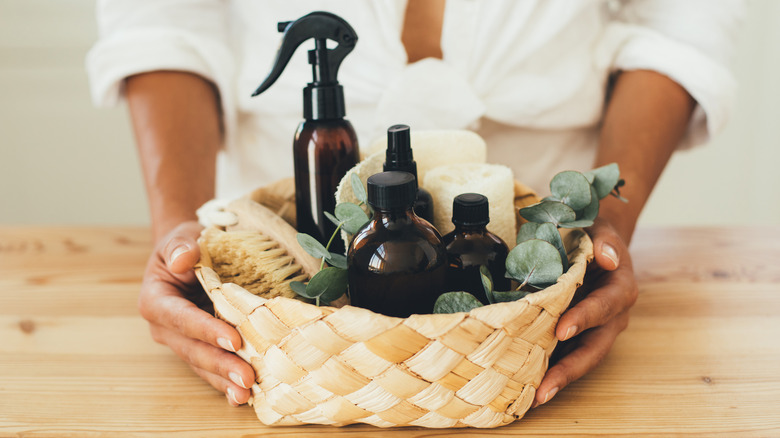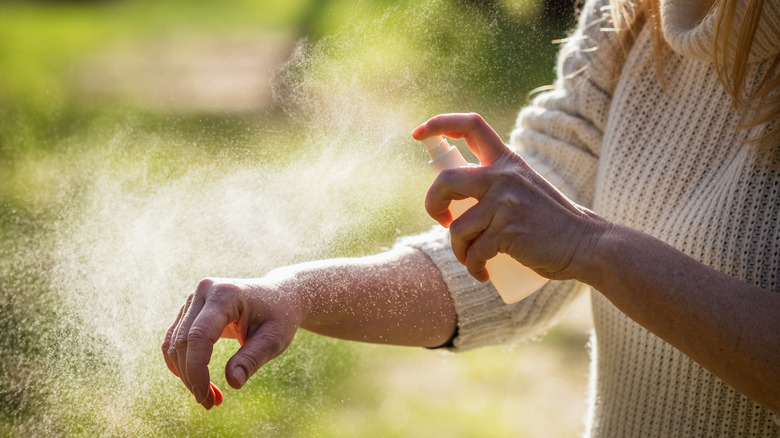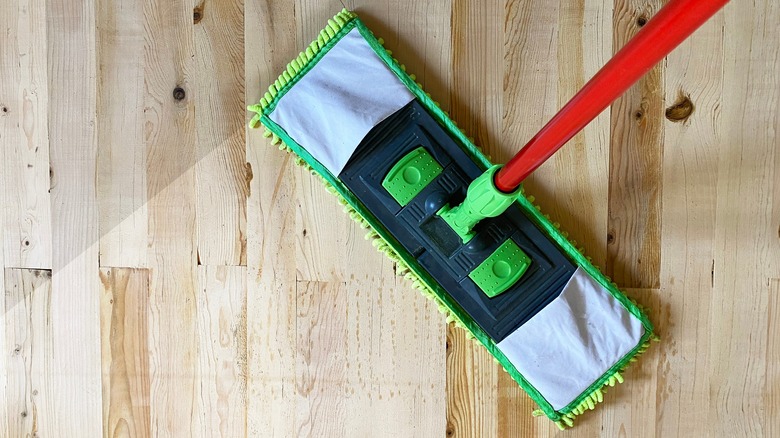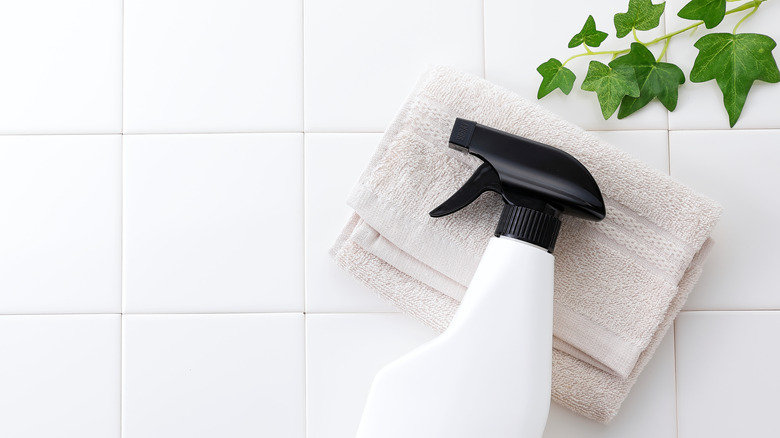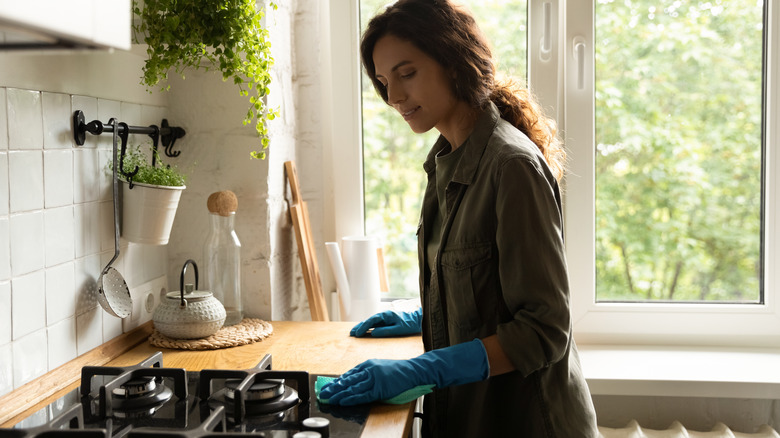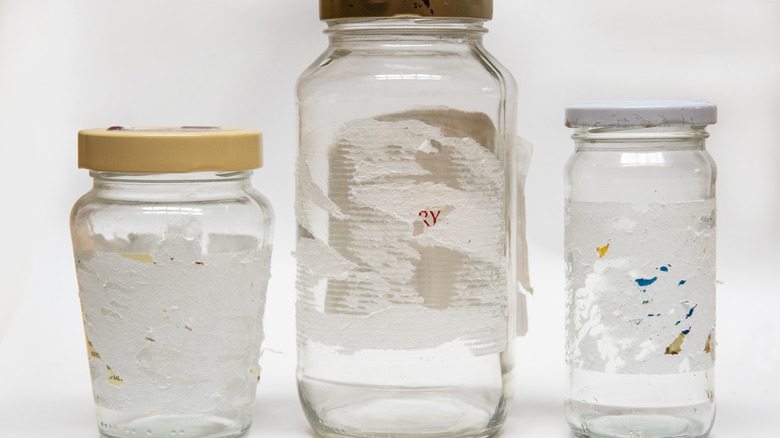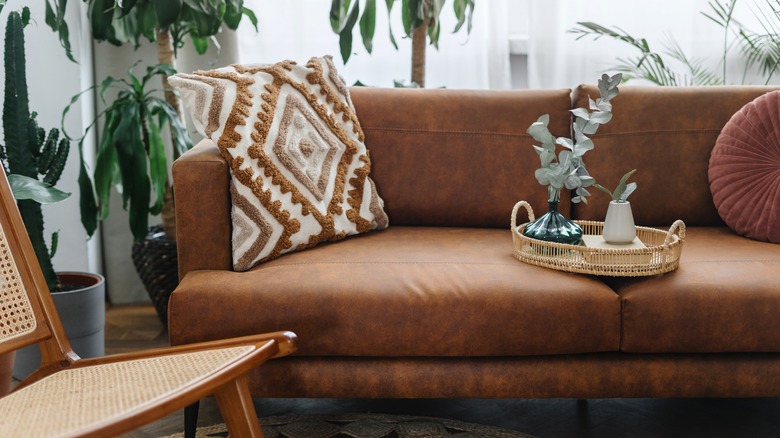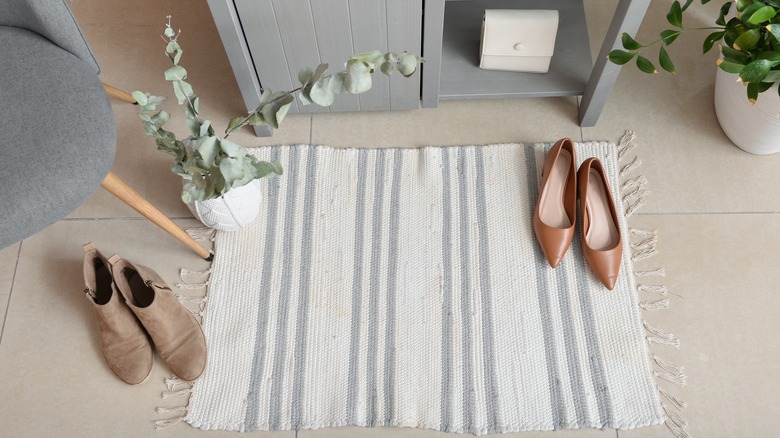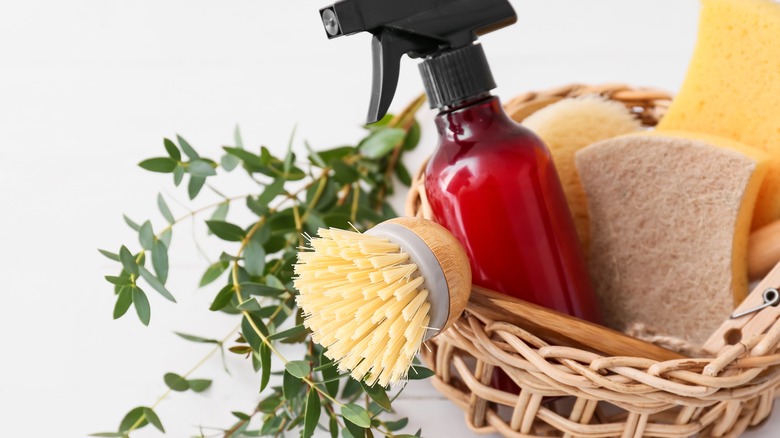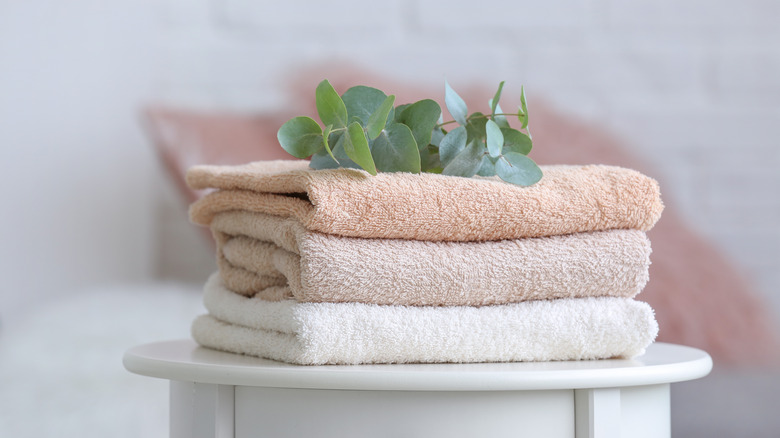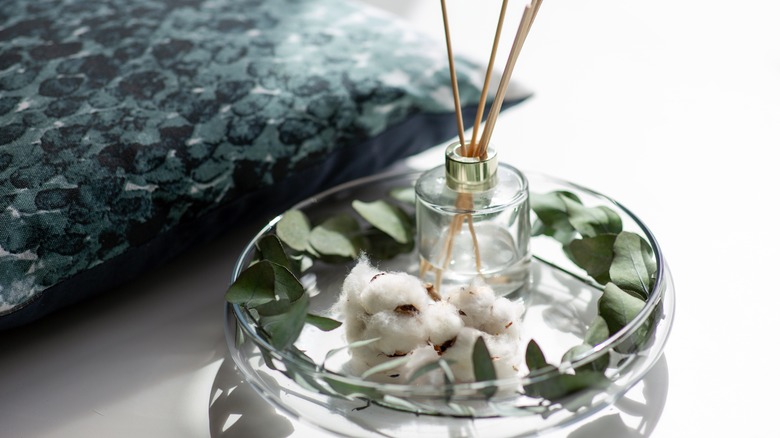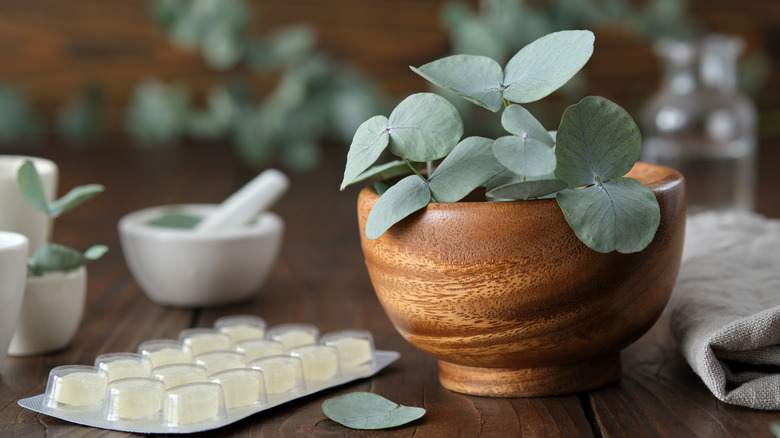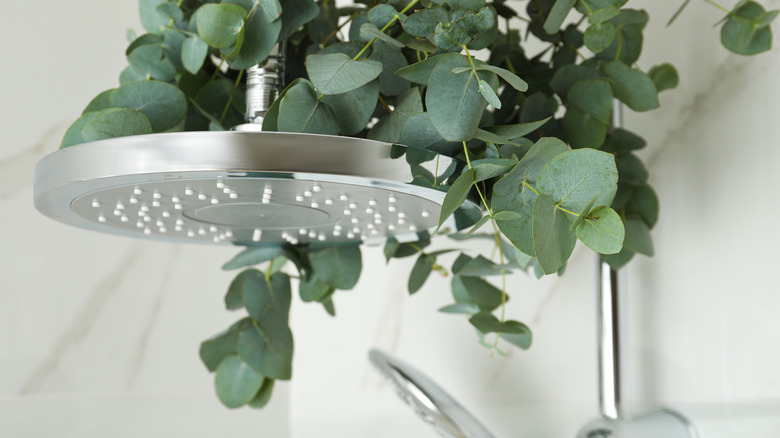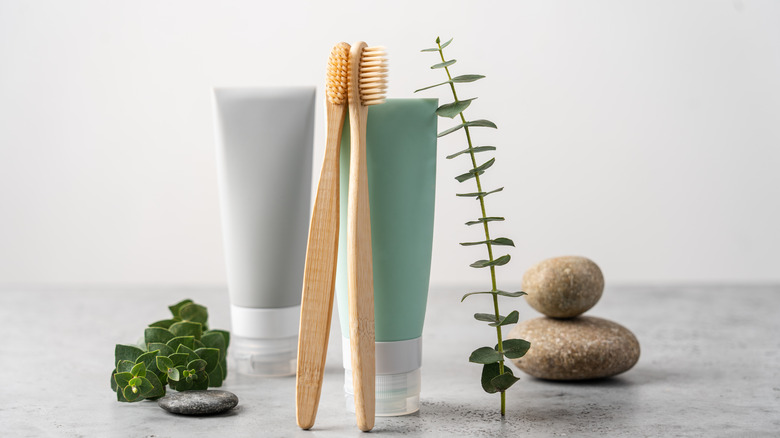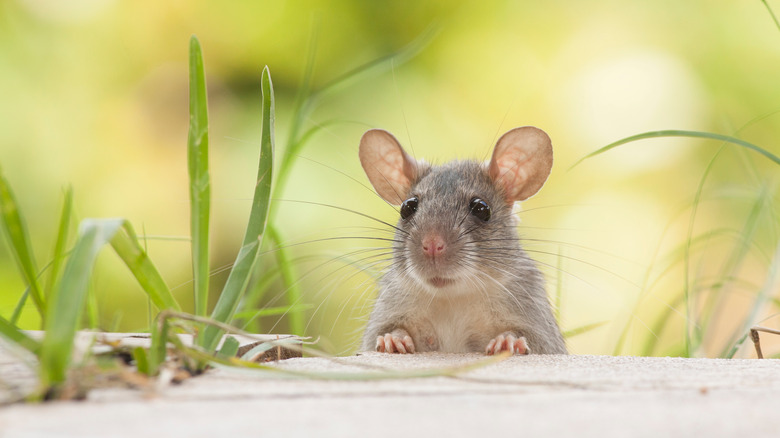Ways You Can Be Using Eucalyptus Essential Oil In Your Home
Natural cleaning products are a way of life for many of us, but even the most hardcore do-it-yourself product makers may be astonished by the seemingly unlimited benefits of one simple essential oil that comes from the eucalyptus tree (Eucalyptus globulus). That's right, Mount Sinai Health Systems reports that the primary food source for koala bears Down Under is one of the most potent cleansers and healers naturally available to us.
Eucalyptus oil can clean, disinfect, and deodorize areas and items all over your house. Then it can turn right around and help you and your body stay mentally and physically well as an expectorant, muscle pain reducer, plaque buster, anxiety reliever, insect repellent, and much more. Below, we're taking a close look at fifteen of the best ways to harness the cleansing power of nature's favorite antiseptic, all of which can be incorporated into your home and wellness routine in no time flat. Trust us when we say, you're about to be blown away.
Insect repellent
Some of us douse ourselves with the strongest DEET-based insect repellent we can find on the market, while others prefer to take a more chemical-free route when it comes to protection from pesky mosquitos and everything else that flies around our decks while we're trying to relax and enjoy a sunset. If you're in the latter category, then you've likely considered mixing up a little DIY spray repellent to keep on hand.
According to the Old Farmer's Almanac, strong scents inhibit an insect's ability to find human skin through their sense of smell. Lemongrass, citronella, mint, and rose geranium are popular essential oils for this, and eucalyptus is definitely included among them. Essential oil from the lemon eucalyptus tree (Corymbia citriodora) is especially beneficial against mosquitos, ticks, and lice, but it can be irritating for toddlers and those who are pregnant or nursing. So, add that one if you can; just be a little cautious when you do. To make your own concoction, you'll need to include a base liquid along with the oil. Witch hazel, isopropyl alcohol, and apple cider vinegar are the most common options.
Wood floor cleaner
It's not just that eucalyptus oil can be used to clean hardwood floors, it'll leave an absolutely pleasing scent behind when it's done. Per HomeSteady, the disinfectant properties combined with its natural ability to lift years-old grime make it an excellent choice for gleaming hardwood. The oil is safe to use on both unfinished floors and those coated with urethane.
Two gallons of hot water plus a cup of white vinegar are all you need in addition to about 25 drops of essential eucalyptus oil. Give it a good stir and you'll be ready to mop. Home Steady recommends a natural fiber mop, but really whatever you have will work just fine. You may be tempted to dump your waste water outside since the cleaning ingredients are all natural. Unfortunately, the essential oil could potentially damage gardens or landscaping plants if it's poured directly onto them. When the work is done, pour the dirty water down the drain instead.
Mold and mildew fighter
We all know mold and mildew are dangerous to our health, and the EPA confirms it. They thrive in areas of our homes that stay moist and humid, like window ledges, bathtubs, and shower tiles. But as we attempt to rid our homes of one noxious element, do we really want to introduce others in the form of harsh chemicals? Eucalyptus oil offers us an alternative.
The antimicrobial effects of essential eucalyptus oil have been well studied by scientists. Per the National Library of Medicine, the oil has long been used safely in non-commercial home remedies. Furthermore, it has been proven to have antifungal properties. It's interesting to note that in the study cited, essential oils outperformed vinegar, a usually versatile cleaning tool, and other standard cleaners as well.
While it won't actually kill mold, Mould Men says eucalyptus oil is excellent at removing limited amounts of growth and preventing more from accumulating. In a spray bottle, mix equal parts eucalyptus oil and denatured alcohol with 2 cups of water. Let the spray dry on the surface and use a cloth to wipe away residue after it has dried.
Grease cutter
In the world of natural cleaning products for the home, eucalyptus oil has a reputation as a magic miracle. Not only will it shine your floors and help you remove dangerous and unhealthy mold and mildew from your bathrooms, but it can also be used in the kitchen. Eucalyptus oil and a scouring pad are all it takes to tackle built-up grease on your stovetop or inside the oven.
Bloggers at Stay At Home Mum in Australia have the recipe for success. They add 2 teaspoons of essential eucalyptus oil to a spray bottle with water and a squirt of dishwashing soap; really just a teaspoon of that will do. Easy peasy. Just give it a good shake to mix everything together and you'll be ready to start scrubbing. Stay At Home Mum swears by this simple spray to cut through grease and grime left on stove tops and inside of microwave ovens.
Sticky residue eliminator
If you can believe it, the straight up magical cleansing capabilities of eucalyptus oil do not stop at grease and grime in the kitchen, and that's because its compounds naturally produce a powerful solvent. The next time you get stuck with a label that refuses to peel off of a jar or just a bit of incredibly annoying sticky residue on anything you would like to remove it from, bust out the essential oil. For this cleaning hack, ekko.world points out that you don't need anything else besides something for wiping the mess away. A cotton ball or clean rag will do the trick.
In a video posted to the Daily Mail, you can see just how quick, easy, and effective it is. The person in the video pours oil on a completely gunked up mirror and just lets it sit. Within a few minutes, the oil does all of the work. From there, all they have to do is wipe away the loosened residue. It could not be any easier!
Leather sofa spot cleaner
If you have a leather sofa anywhere in your home or office, it is likely an expensive and prized piece of furniture. You've worked hard over the years to keep the leather properly conditioned and everyone in the house knows to never eat food on the sofa. And then, lo and behold, there's an accident; someone (definitely not you) accidentally spills something on your irreplaceable heirloom furniture. It's a stressful situation and another very good reason to keep a bottle of eucalyptus oil in your home at the ready, at all times.
Terry's Steam Cleaning cautions that using the wrong product to clean leather upholstery can result in color distortions and irreparable damage, which you already knew, thus the exacting care and attention given it all these years. Well, wouldn't you know it? Eucalyptus oil will come to your rescue yet again. For an inexpensive, chemical-free solution to your leather upholstery cleaning needs, mix eucalyptus together with olive and lemon oils, and vinegar. Now sit back and relax knowing your expensive furniture will stay beautiful even longer than you expected.
Carpet deodorizer
We've mopped the hardwood floors, cleaned mildew from the shower and tub combo, disintegrated grease and sticky residue, and spot-cleaned the leather couch. Is there anything left? Oh yes, the carpets.
Living Well Mom has a helpful tip for how to make homemade natural carpet deodorizer. In this case, any essential oil can work because you're ultimately relying on creating a pleasant scent. Living Well Mom likes a tea tree, chamomile, lavender combination, but if you think about it, the carpet is an important place to make use of the antimicrobial benefits of eucalyptus. After all, it doesn't just smell good, it has important cleaning properties to boot. And you don't want to be covering up bad odors, you want them dead and gone.
The DIY recipe for this one combines a large amount of baking soda, at minimum 2 cups, with around 20 drops of essential oil, or more of both for large areas. And how about this bonus hack: Living Well Mom suggests putting it all together in an empty Parmesan cheese canister, which will be exactly what you need for shaking your mixture onto the carpet. After sprinkling, let it sit for as long as you like, but at least 30 minutes. Then just vacuum it up as you would regular deodorizer and enjoy the bliss of a delightfully-scented room.
Disinfectant spritzer
Bosisto's of Australia has the down low on how to best harness the disinfectant properties of eucalyptus into a powerful everyday all-purpose spray cleaner. They claim it's so good it even works on dirty shoes. The basic ingredients are 1 cup of water, ⅓ cup of white vinegar, 1 or 2 teaspoons of liquid dishwashing soap, and eucalyptus oil, which you can measure how you see fit depending on the strength you want to give your spray. Eucalyptus has a strong scent, so start with less and add more until you reach the level of fragrance you want.
The final ingredient in Bosisto's recipe is 2 teaspoons of Lectric soda, which is basically washing soda. It may prove difficult to find, and should not be confused or replaced with baking soda. Since it's important for DIY cleaning product makers to know their sodas, Bren Did – Green Cleaning Simplified explains that the primary difference is one of safety. Washing soda is much stronger than baking soda. In fact, it is caustic and improper handling can result in burns on the skin or damage to the eyes. Never ingest it, wear gloves when mixing it into your cleaning spray, and immediately rinse out your eyes if they start to feel itchy.
Safety precautions aside, washing soda is a common and effective ingredient found in many household cleaners. It's the raw product that you really need to be careful with. When you're on the hunt for it, note that you might find it listed as soda ash or sodium carbonate (whereas baking soda is sodium bicarbonate).
Laundry freshener
Since eucalyptus oil is effective on grease stains in the kitchen, it makes sense that it would also work well on grease stains on towels and clothes. And who hasn't accidentally spilled cooking oil on their spotless white pants while rushing to get the entrée into the oven before everyone finishes their appetizers? (Okay, well, we certainly have.) According to massage therapist Earth to Kathy — who knows a thing or two about spilling oil on her clothes — trusty eucalyptus is a great additive to laundry.
Kathy recommends concocting a stain removing pre-treatment spray by combining 2 cups of white vinegar, 1 cup of hydrogen peroxide, 1 cup of water, 2 teaspoons of eucalyptus oil, 2 teaspoons of Dawn dish soap, and 2 teaspoons of baking soda. A few notes on the recipe here: Kathy likely suggests Dawn specifically because it is widely considered to be the best detergent when it comes to removing grease (via Good Housekeeping). So good, it is the go-to choice for gently but thoroughly cleaning birds in cases of oil spills, says NPR. Also, be careful when mixing baking soda and vinegar because you'll probably get some bubbling.
When you've got some down time from the piles of laundry that never seem to go away (yah, right), another way to use the cleansing powers of eucalyptus in regards to laundry is to clean your actual machine. Pour about 20 drops into the washer when it's empty, and then run it on a rinse cycle.
Relaxation inducer
Besides the fact that we all instinctively know a whiff of eucalyptus can instantly put even the craziest of cats at ease, it's actually been scientifically proven. Clinical studies show eucalyptus oil improves cognitive function, relaxes muscles, and helps us reach a state of mental calm (via the National Library of Medicine). The compound in eucalyptus that is responsible for easing tension is called cineole, and these plants are filled with it. It follows that essential oil from the plant offers a powerful punch of mood boosting fragrance when inhaled.
Using fragrance in your home to induce relaxation is an excellent way to get even more benefit from a simple product that you've just learned can clean basically everything you own. Maybe you want to create a meditation corner in one area of the house with an essential oil diffuser. Or, perhaps scented candles are your go-to mood setter. However you choose to incorporate eucalyptus oil in its pure form as a fragrance, it will no doubt help ease anxiety and bring an aura of pleasantness to your home.
Respiratory reliever
The medicinal benefits of eucalyptus oil include treatment for arthritis and skin ulcers (via Rx List), but the most well-studied and common use for it is respiratory health. Per Medical News Today, using eucalyptus oil has been scientifically proven to relieve the respiratory distress associated with sinusitis and congestion. Not only is it safe and 100% natural, but it legitimately works. In addition to congestion relief, it can be an effective treatment for headaches and runny noses. So, now we can add over the counter cold remedy replacement to the incredibly long list of positions this versatile oil seems more than happy to fulfill.
Once again, it's the cineole compounds that are doing the heavy lifting. To get the best results when you're feeling under the weather, directly inhale the oil or use it as a chest rub. Don't go overboard with the amount you use. Of course, too much of anything can be bad, and some overzealous study participants experienced a coinciding rash or heartburn.
Shower infuser
To make your home truly feel like a luxurious spa, try using eucalyptus in the shower while you're in there cleaning yourself off. You can create a eucalyptus steam shower by simply hanging fresh or dried leaves around the shower head, but Natural Habitat Magazine says you'll get a more powerful boost by rubbing oil between your hands or placing a few drops on the bottom of your shower. This will allow the scent to rise up from below and gently enter your nostrils along with the steam.
You'll experience all of the respiratory benefits of the essential oil while being thoroughly enveloped by a steam shower fit for royalty. It all sounds pretty great if you ask us.
Interestingly, eucalyptus has the ability to both invigorate your senses during your morning routine and calm your nerves and muscles during a post-workout rinse-off later or at the end of a hectic day. Just be careful not to spill too much oil on the floor of your bathtub or shower stall. We'd hate to have you turn your blissful home spa into a slipping hazard.
Plaque buster
We're not kidding around when we say that eucalyptus oil can also help improve oral health. Cirocco Dental Center of Pennsylvania explains that nature's remedy is beneficial to teeth, gums, and your entire mouth. The antiseptic and antimicrobial properties that work so well on your counters and laundry can further be put to use on your toothbrush. It aids in the fight against oral bacteria, which is the main proponent of problems like gum disease and tooth decay.
A little will go a long way when using eucalyptus orally. By combining just a few drops in water with other essential oils such as peppermint, tea tree, cinnamon, and lemon, you can make a homemade mouthwash, says Find Health Tips. Dentists have found this mixture helps reduce plaque and prevent cavities. Cirocco Dental Center adds that regular use of eucalyptus oil can significantly lower your chances of needing braces or dentures in your later years.
Pest controller
Of course, we know they mean no harm, but even the cutest mouse in the world can be deemed a pest once it has entered into our living space. The most ethical way to deal with the problem of rodents in the home is to figure out how to prevent them from coming inside in the first place. According to the Old Farmer's Almanac, eucalyptus has the potential to naturally encourage pests such as rats, mice, and pantry moths to stay away. Simply dab cotton balls with the oil and leave them to sit on top of counters and inside cabinets and drawers.
In order for this to be an effective treatment, you'll need to locate every possible point of entry; that means looking for cracks in the baseboards and small holes in walls. Check closed doorways and windowsills to see if there's room for a small pest to make it's way into a room through even the slimmest gaps, and run a hand along the backs of your cupboards. Any place that has already seen a bit of damage is a good one for a soaked cotton ball, in the hopes of stopping the destruction before it gets worse. One final tip from the Old Farmer's Almanac is to rub a small amount of oil along exposed wires to deter pests from chewing on them.
